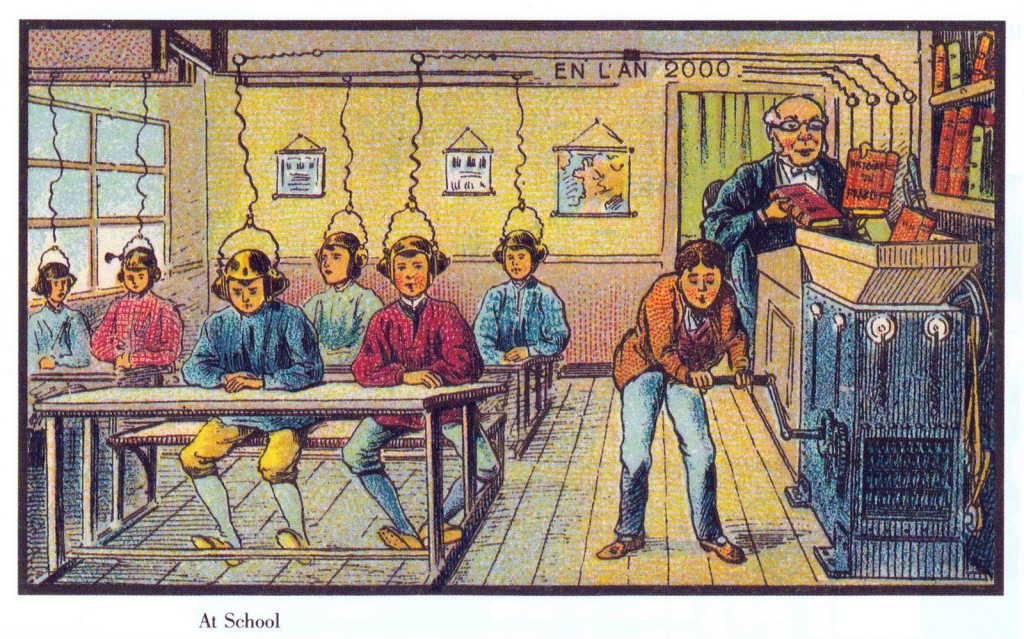A friend of mine (and a career educator) recently shared an article with me titled Shifting from Pedagogy to Heutagogy in Education. ‘Heutagogy’ is a term coined by by Stewart Hase and Chris Kenyon of Southern Cross University in Australia. It’s derived from the Greek roots for ‘self’ and ‘leading’. Heutagogy is, essentially, self-determined learning.
The criticism of a pedagogical approach to education is that it’s a teacher-centered activity, and that even in the most engaging learning experiences, “the teacher is still actively designing the learning task and process.” In the article, the example of an ancient fire engine is used to illustrate the difference between pedagogy and heutagogy. A teacher-centered approach would be to show a few images of the machine, delve into the manual, discuss, practice and then assess for competency. A student-centered, heutagogical approach would be to let students “play with the machinery and leave the manual on the seat.”
In this example, the instructor would play watchman and make sure that nothing went significantly wrong, but he/she would otherwise let students determine what they needed to know and how they’d go about learning it. It’s argued that this is more of a humanist approach to the learning process, and thus more empowering.
I’m a product of the traditional, industrialized, production line public education system. I didn’t like it. I’m also guilty of being a knowledge hoarder in my own classroom. I look back on the beginning of my career as an educator and shake my head when I think about how I made myself the keeper and the gateway to the knowledge and how I offered students very few options in their own learning process.
I’ve made some serious attempts throughout my career to use a variety of instructional methods, to blend technology, to flip the classroom, to use a fair grade book, and (most importantly) to offer students a lot of choices. All that said, I don’t know if I could just leave the manual on the seat, but it’s definitely food for thought. What do you think? What’s your take on pedagogy vs. heutagogy or even andragogy for that matter?



I think this is an interesting subject, Ryan. There are parts of ‘the teacher’ me that bridle at the concept of self-determined learning, because I feel there are things lost when self-direction takes over the process. For one, what happens to the measurability of the product of our educational institution? Secondly, if everyone determines what they are to learn, what becomes of learning outcomes that may be important. Third, what happens to those branches of the tree that are not obvious to the learner? Can a learner really guide themselves to a comprehensive education?
On the other hand, most of us are teachers because of our essential nature as self-directed learners. It is our compulsion to put together the pieces of the puzzle to discover the universe hidden in the blank spaces that draws us to academia. Certainly we want to share that wonder with our students.
I understand that there are probably answers to these questions that are compatible with heutagogy, so I believe this is worth ongoing discussion. How do we free our learners to engage in original manners with our subject matter, while not losing our ability to measure our output? And is some standardization of our output necessary and important, or could we evolve higher education in such a way as to transcend that and still meet the needs of the society that supports and depends upon us?
Hey Keith – thanks for reading my post. I think you pose the million dollar question:
“How do we free our learners to engage in original manners with our subject matter, while not losing our ability to measure our output?”
When you figure it out, please let me know 😉
Hey Ryan,
We can measure the attainment of facts, models, processes and procedures. How do we measure insight, wisdom, motivation, an open mind….? All aspects of an educated person in my estimation.
Hi Rob – thanks for reading the post. You’re exactly right – there isn’t a rubric in the world that can really adequately help us evaluate those traits that we admire so much in our students (and people in general). I think a lot of us try to include a ‘participation’ grade or something like that, but there isn’t a learning outcome for being a conscious, conscientious, compassionate person.
Being in the library, I know I have a very different teaching experience than all the instructors, but part of me worries (and maybe you do too), that if they are left to self direct, well, maybe they would go no where and never experience the joy we all feel learning.
Hi Michelle – thanks for reading my post. I’m not an advocate for Heutagogy – it was really just an interesting topic I read about. I am an advocate for offering choice within assignments/assessments so there’s room for students to make the concepts relevant to their own lives and their own interests. I think that’s where the ownership of our own experience comes in. We all have a lens through which we view the world and new information that’s presented to us. I feel like a good teacher when I can help students understand information I have using their lens. But I also feel like a good teacher when I can guide them and have a good bit of control over the learning variables. 🙂